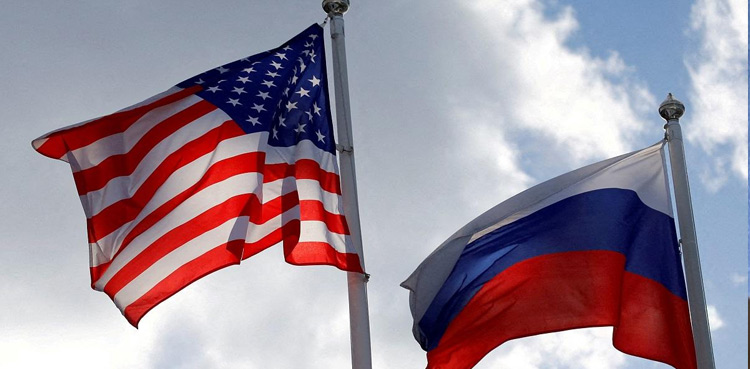Russia vetoed a US-drafted UN Security Council resolution aimed at preventing an arms race in outer space. The US accused Russia of developing anti-satellite nuclear weapons for space, which Russia denied. Both countries traded accusations at the UN. The resolution received 13 votes in favor, with China abstaining and Russia casting a veto.

Russia on Wednesday vetoed a US-drafted United Nations Security Council resolution that called on countries to prevent an arms race in outer space.
The vote came after Washington accused Moscow of developing a anti-satellite nuclear weapon to put in space, an allegation that Russia has denied. Russian President Vladimir Putin has said that Moscow was against putting nuclear weapons in space.
“Today’s veto begs the question: Why? Why if you are following the rules would you not support a resolution that reaffirms them? What could you possibly be hiding?” US Ambassador to the UN Linda Thomas-Greenfield told the council after the vote. “It’s baffling and it’s a shame.”
Russia’s UN Ambassador Vassily Nebenzia accused Washington of trying to tarnish Moscow and said Russia would shortly begin negotiations with council members on its own draft resolution aimed at keeping space peaceful.
“We want a ban on the placement of weapons of any kind in outer space, not just (weapons of mass destruction). But you don’t want that … Let me ask you that very same question: Why?” Nebenzia asked Thomas-Greenfield in the council.
The draft resolution was put to a vote by the US and Japan after nearly six weeks of negotiations. It received 13 votes in favor, while China abstained and Russia cast a veto.
The UN text would have affirmed an obligation to comply with the Outer Space Treaty and called on states “to contribute actively to the objective of the peaceful use of outer space and of the prevention of an arms race in outer space.”
The 1967 Outer Space Treaty bars signatories – including Russia and the United States – from placing “in orbit around the Earth any objects carrying nuclear weapons or any other kinds of weapons of mass destruction.
The recent showdown between Russia and the United States at the United Nations regarding the potential deployment of nuclear weapons in space has raised concerns and created a tense atmosphere in the international community. The dispute revolves around the possibility of weaponizing space, thereby escalating the arms race and threatening global security. Both countries have expressed opposing views, with Russia highlighting the need for a treaty to prevent the placement of weapons in outer space, while the US argues for retaining the option of strategic defense. The implications of such a conflict are far-reaching and could have significant ramifications for the future of space exploration and geopolitical stability.
The militarization of space poses profound ethical and practical challenges, prompting calls for international cooperation and dialogue. Advocates for a peaceful and collaborative approach emphasize the importance of preserving space as a peaceful domain for scientific exploration and technological advancement. The potential risks associated with the weaponization of space demand a thoughtful and comprehensive approach from global leaders and policymakers.
As the debate continues, it is crucial for the international community to address this critical issue with diplomacy and pragmatism. Heightened tensions regarding the use of space for military purposes underscore the urgent need for transparent dialogue and a commitment to maintaining the peaceful use of outer space. The implications of this dispute extend beyond the immediate concerns of the involved nations, ultimately impacting the broader landscape of space governance and international security.
In navigating this complex and sensitive issue, a thoughtful and balanced approach is essential. Maintaining a focus on transparency, dialogue, and mutual respect is fundamental to fostering an environment conducive to constructive collaboration and peaceful resolution. The outcome of these discussions will reverberate in the realm of space exploration and will significantly influence the trajectory of international relations.
The clash between Russia and the US over the potential deployment of nuclear weapons in space serves as a stark reminder of the profound responsibilities that come with exploring and utilizing the cosmic frontier. As the international community grapples with these weighty considerations, it is imperative to prioritize open dialogue and cooperative efforts to ensure the peaceful and sustainable use of outer space for the benefit of all humankind.
Source: ARY NEWS
The US-drafted UN resolution on preventing an arms race in outer space was vetoed by Russia, leading to a clash between the two nations. The US accused Russia of developing anti-satellite nuclear weapons for space, which Russia denied. Both countries expressed opposing views on the placement of weapons in outer space. The draft aimed to affirm compliance with the Outer Space Treaty and promote peaceful use of outer space. The veto prompted questions about motives and intentions. Russia plans to initiate negotiations on its own resolution. The clash highlights the ongoing tensions and differing perspectives on space weaponization.
Disclaimer:
This content is AI-generated using IFTTT AI Content Creator. While we strive for accuracy, it’s a tool for rapid updates. We’re committed to filtering information, not reproducing or endorsing misinformation. – Khabristan.pk for more information visit privacy policy








Leave a Comment